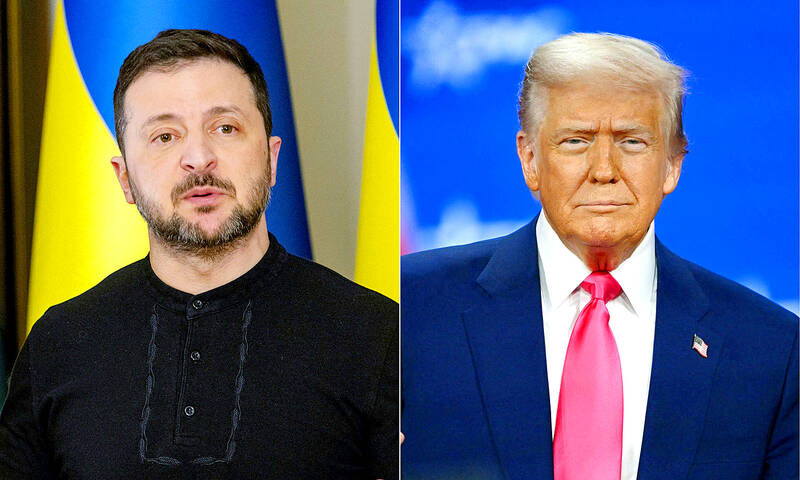Ukraine and the US have reached an agreement on a framework for a broad economic deal that would include access to Ukraine’s rare earths, three senior Ukrainian officials familiar with the matter said on Tuesday.
The officials spoke on condition of anonymity because they were not authorized to speak publicly.
One of them said that Kyiv hopes that signing the agreement would ensure the continued flow of US military support that Ukraine urgently needs.

Photo: AFP
The agreement could be signed as early as tomorrow and plans are being drawn up for Ukrainian President Volodymyr Zelenskiy to travel to Washington to meet with US President Donald Trump, one of the officials said.
Another official said that the agreement would provide an opportunity for Zelenskiy and Trump to discuss continued military aid to Ukraine, which is why Kyiv is eager to finalize the deal.
Trump, speaking to reporters in the Oval Office at the White House, said he had heard that Zelenskiy was to travel to the US and added: “It’s okay with me, if he’d like to, and he would like to sign it together with me.”
Trump called it a big deal that could be worth US$1 trillion.
“It could be whatever, but it’s rare earths and other things,” he said.
One of the Ukrainian officials said that some technical details were still to be determined.
However, the draft did not include a proposal by Washington to give it US$500 billion of profits from Ukraine’s rare earths as compensation for its wartime assistance to Kyiv.
Instead, the US and Ukraine would have joint ownership of a fund and Ukraine would contribute 50 percent of future proceeds from state-owned resources, including minerals, oil and gas.
One official said that the deal had better terms of investments and another one said that Kyiv secured favorable amendments and viewed the outcome as “positive.”
However, the deal does not include security guarantees.
One official said that this would be something the two presidents would discuss when they meet.
The progress in negotiating the deal comes after Trump and Zelenskiy traded sharp rhetoric last week about their differences over the matter.
Zelenskiy said he balked at signing a deal that US Secretary of the Treasury Scott Bessent pushed during a visit to Kyiv earlier this month, and the Ukrainian leader objected again days later during a meeting in Munich with US Vice President J.D. Vance because the US proposal did not include security guarantees.
Trump then called Zelenskiy “a dictator without elections” and said that his support among voters was near rock-bottom.
However, the two sides made significant progress during a three-day visit to Ukraine last week by retired Lieutenant General Keith Kellogg, Trump’s special envoy to Ukraine and Russia.
The idea was initially proposed last fall by Zelenskiy as part of his plan to strengthen Kyiv’s hand in potential negotiations with Moscow.

VAGUE: The criteria of the amnesty remain unclear, but it would cover political violence from 1999 to today, and those convicted of murder or drug trafficking would not qualify Venezuelan Acting President Delcy Rodriguez on Friday announced an amnesty bill that could lead to the release of hundreds of prisoners, including opposition leaders, journalists and human rights activists detained for political reasons. The measure had long been sought by the US-backed opposition. It is the latest concession Rodriguez has made since taking the reins of the country on Jan. 3 after the brazen seizure of then-Venezuelan president Nicolas Maduro. Rodriguez told a gathering of justices, magistrates, ministers, military brass and other government leaders that the ruling party-controlled Venezuelan National Assembly would take up the bill with urgency. Rodriguez also announced the shutdown

Civil society leaders and members of a left-wing coalition yesterday filed impeachment complaints against Philippine Vice President Sara Duterte, restarting a process sidelined by the Supreme Court last year. Both cases accuse Duterte of misusing public funds during her term as education secretary, while one revives allegations that she threatened to assassinate former ally Philippine President Ferdinand Marcos Jr. The filings come on the same day that a committee in the House of Representatives was to begin hearings into impeachment complaints against Marcos, accused of corruption tied to a spiraling scandal over bogus flood control projects. Under the constitution, an impeachment by the

Exiled Tibetans began a unique global election yesterday for a government representing a homeland many have never seen, as part of a democratic exercise voters say carries great weight. From red-robed Buddhist monks in the snowy Himalayas, to political exiles in megacities across South Asia, to refugees in Australia, Europe and North America, voting takes place in 27 countries — but not China. “Elections ... show that the struggle for Tibet’s freedom and independence continues from generation to generation,” said candidate Gyaltsen Chokye, 33, who is based in the Indian hill-town of Dharamsala, headquarters of the government-in-exile, the Central Tibetan Administration (CTA). It

A Virginia man having an affair with the family’s Brazilian au pair on Monday was found guilty of murdering his wife and another man that prosecutors say was lured to the house as a fall guy. Brendan Banfield, a former Internal Revenue Service law enforcement officer, told police he came across Joseph Ryan attacking his wife, Christine Banfield, with a knife on the morning of Feb. 24, 2023. He shot Ryan and then Juliana Magalhaes, the au pair, shot him, too, but officials argued in court that the story was too good to be true, telling jurors that Brendan Banfield set